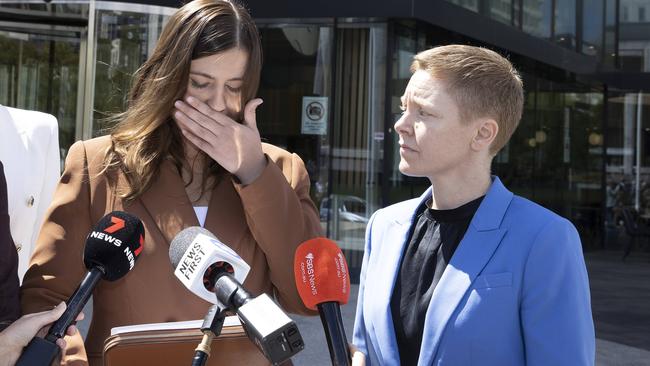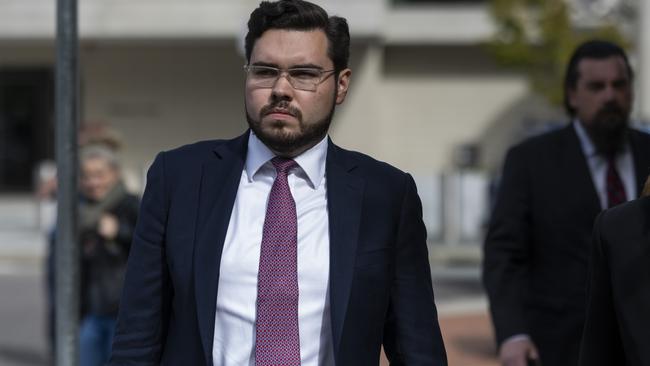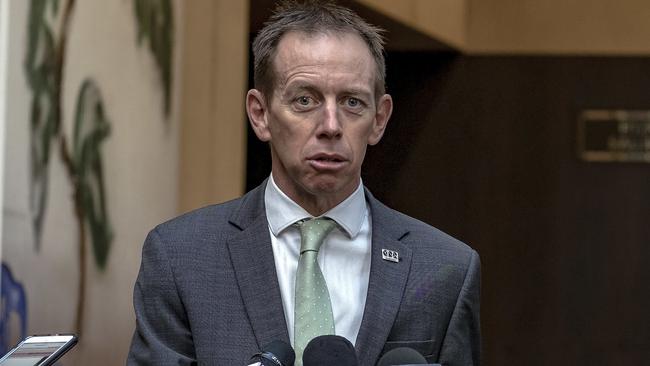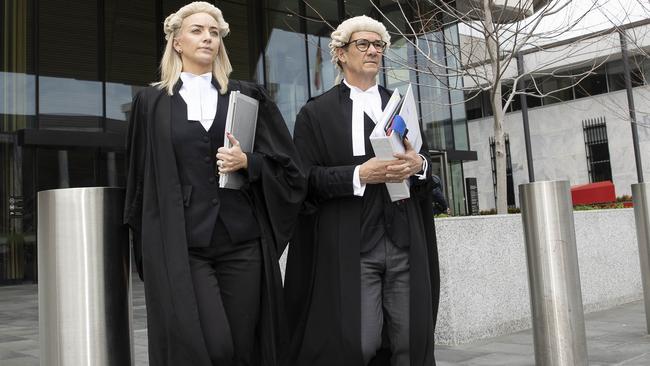
This proposed legal change being rushed through the ACT parliament potentially moves the goalposts for ACT Director of Public Prosecutions Shane Drumgold, making it easier for him to retry Lehrmann after the first trial was aborted in October.
In an email obtained by The Australian, sent on Wednesday morning by Robyn Hakelis, executive branch manager of legislation, policy and programs in the ACT Attorney-General’s Department, to the ACT Bar Association, the ACT Law Society and other legal bodies, Hakelis said the ACT Attorney-General is planning to change the Evidence Act so that testimony given by a complainant in court can be recorded and can be admissible in a retrial. Hakelis says the change “is scheduled for introduction in the week commencing 28 November 2022”.
This hasty change to the law has the perception of being aimed squarely at the retrial of Lehrmann. It means that Brittany Higgins may not be required to enter a courtroom and give evidence or be cross-examined again.

Here is the legal background to this bewildering change. Under section 68(2) of the ACT Evidence Miscellaneous Provisions Act, when a complainant gives evidence in a sexual assault case, that person “must” give evidence in a remote witness room by audio-visual link. That is intended as some form of protection to a complainant from the trauma of giving evidence in court.
Higgins chose to apply, as is her right under section 68(3) of the Evidence Act, to override section 68(2) and give a large part of her evidence in the Canberra courtroom in full view of the jury, the DPP, defence lawyers, the accused and in full view of the public gallery, which included, of course, hordes of journalists from Australian media outlets. That was Higgins’s choice.
Only the early part of her evidence, including her police record of interview, was given by audio-visual link from a remote witness room.
Under section 69(2) of the ACT Evidence Act, evidence given by a witness by audio-visual link must be recorded, and under section 69(3), that recorded evidence is admissible in a related proceeding, unless the court in that later proceeding decides otherwise.
Under the current law, there is no provision for the evidence given by Higgins in the courtroom to be recorded, and there is no law that makes that recording admissible in a retrial.
The ACT Attorney-General’s rushed change to this law meaning Higgins’s in-court evidence can be used in a retrial needs to be understood against that legal background, and against what followed after the trial was aborted.

Soon after ACT Chief Justice Lucy McCallum discharged the jury on October 27, Higgins stood outside the courtroom and expressed her outrage at the criminal justice system. Her message was clear: she seemed to think that the system had failed her by failing to find Lehrmann guilty.
Many lawyers told The Australian that they understood the tenor of her statement to mean that Higgins would not be returning to the witness stand for a retrial.
That left the DPP and the ACT Victims of Crime Commissioner, Heidi Yates, facing two realities: no resolution to one of this country’s most high-profile criminal trials and a complainant declaring that the system that both Drumgold and Yates work in had failed her. It was Drumgold’s decision to prosecute this case. Yates chose to accompany Higgins, in full view of cameras, when Higgins appeared in court to give evidence. Yates was right next to Higgins when the former political staffer made her emotional statement outside the court.
The question for them surely became how to retry Lehrmann if Higgins would not agree to give evidence in a future trial?
Enter ACT Attorney-General Shane Rattenbury. His extraordinary proposal to alter the existing law will, effectively, make it easier for the DPP to retry Lehrmann if Higgins chooses not to give evidence in court in a new trial.

Many lawyers have told The Australian they are stunned by this development and by the perception of political interference in the retrial of Lehrmann. There are other bizarre parts in the background to the A-G’s move. The Australian understands that Higgins’s in-court evidence was recorded even though no order was made to that effect.
The draft bill released on Wednesday morning came with no explanatory memorandum, and no human rights analysis that is ordinarily attached to a bill by parliament, especially one that tampers with the rights that apply to a defendant in a criminal trial.
It is as if the Attorney-General’s department drafted the bill to facilitate a retrial of Lehrmann, with human rights considerations arising as an afterthought.
The A-G’s rush means the merits of this change cannot be considered properly by legal bodies, let alone by the public or by parliament. How can this legal change be debated fully and freely without making comment about its application to an upcoming trial?
It is not surprising then that senior lawyers in the ACT are raising concerns with the A-G’s department and the ACT government about the speed of the change and its likely retrospective application to evidence given in the Lehrmann trial. Without this change to the law, Higgins would have to give evidence in a new trial.
Lawyers have told The Australian that this change appears to try to make legal what was not legal – not just the courtroom recording that happened without a court order, but also by rendering that past recording admissible in the retrial.

There are sound reasons why the Evidence Act draws a deliberate distinction between evidence given in court (which is not recorded and cannot be used for later proceedings) and evidence given remotely by audio-visual link (which is recorded and can be used in later proceedings). Evidence given in a remote witness room by audio-visual link does not involve any of the courtroom drama, or distractions, or direct confrontations that, for example, were on display when Higgins appeared in the witness box in court.
Only the jury sitting in court can fully appreciate those interactions. By contrast, evidence given remotely is sterile in nature, a clearer case of questions asked, and answers given. Deliberately, the witness cannot see the lawyers or the accused, and that necessarily changes the courtroom atmospherics when the witness gives evidence. The law says that latter category of evidence, more sterile in nature, must be recorded and may be admissible in a later proceeding.
This proposed amendment may as well be called Brittany’s law. It makes a mockery of the ACT Attorney-General Department’s stated remit to “maintain a fair, safe and peaceful community in the ACT where people’s rights and interests are respected and protected. This is achieved through maintaining the rule of law, promoting the protection of human rights in the Territory.”
This astounding change strikes at the heart of the criminal justice system’s foundational principle: the rule of law. Its rushed introduction moves the goalposts for the DPP making a retrial of one defendant, in particular, easier. This alone ought to send a shiver down our collective spine. What’s next? A change to the burden of proof? Abolishing the right to silence. And who’s next after Lehrmann?








The ACT Attorney-General plans to change the law that will likely apply to the retrial of Bruce Lehrmann scheduled for February. We are losing our minds if we do not recognise that this undermines the rule of law. And dangerously so.